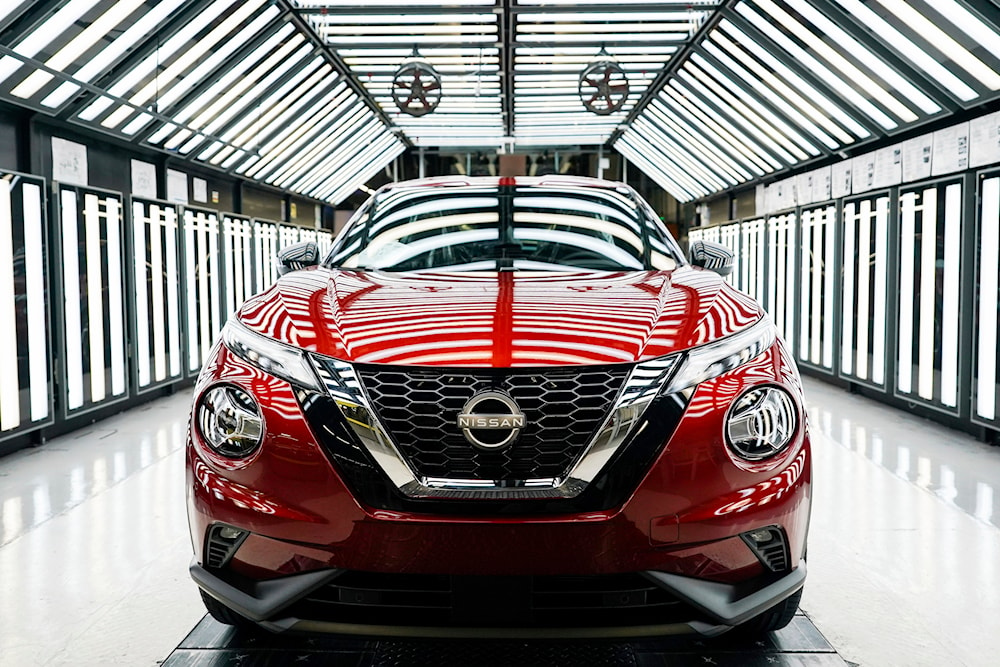Europe lagging behind in raw materials for electric car batteries
Mercedes-Benz, BMW, and Hyundai/Kia were the European carmakers lagging the furthest while Ford, Volkswagen, and Stellantis announced plans for battery mineral supply to reach the levels of rival Tesla and BYD.
-

Nissan car production continues ahead of an announcement by President and CEO Makoto Uchida for further electric vehicle production at the Nissan plant in Sunderland, England, Nov. 24, 2023. (AP)
Analysis shows that European carmakers have not reached a sixth of the key raw materials required by 2030 to manufacture electric vehicle batteries - which amount to contracts for 16% of the lithium, cobalt, and nickel required for sale targets, as stated in public disclosures analyzed by Transport & Environment (T&E), a Brussels-based campaign group.
The world's two largest electric carmakers, US' Tesla and China’s BYD were majorly ahead of their European rivals in access to key raw materials used in devices such as phones.
Electric car sales in China hit 29% of total domestic automobile sales last year, up from 16% in 2021.
The analysis adds that car manufacturers maintained agreements that cover only 14% of lithium, 17% of nickel, and 10% of cobalt that would allow them to reach their sales target by 2030.
This comes as the EU and UK announced the ban on the sale of new fossil fuel cars starting in 2035.
Read more: Electric Cars Will Dominate the Market in 2040
The senior director for vehicles and emobility at T&E, Julia Poliscanova, said, “There is a clear disconnect between carmakers’ electric vehicle [EV] goals and their critical mineral strategies. Tesla and BYD are way ahead of most European players, who are only waking up to the challenge of securing battery metals now.”
According to T&E, carmakers Mercedes-Benz, BMW, and Hyundai/Kia were the European operations lagging the furthest while Ford, Volkswagen, and Stellantis announced plans for battery mineral supply to reach the levels of rival Tesla and BYD.
'Make it or break it'
Secret deals with mining or refining companies have even been made to supply enough materials, as some are looking to eliminate using expensive cobalt and nickel, but the range of lack in supplies in the contracts show the presence of a struggle to reach targets.
Forecasts from data company Benchmark Mineral Intelligence demonstrate that the high demand for the key materials will significantly outstrip supply in the next 10 years.
According to Benchmark, lithium demand will quadruple by 2030 amid the rapid move away from petrol and diesel by China, Europe and then the US.
However, it predicts a lithium shortfall of 390,000 tonnes in 2030, as opposed to the global production of 2.7 million tonnes. Shortfalls of cobalt and nickel are also expected.
Read next: Automaker Stellantis, Samsung to build second EV battery factory in US
Make it or break it
Caspar Rawles, Benchmark’s chief data officer, explained that “In the medium and even the long term, lithium is probably going to be the limiting factor on the rate that the battery industry can scale.”
He noted that large mining projects normally took around five years to launch material production and as long as seven years if the funds were not available, meaning that investment decisions are essential for the next year or two to amp up supply by 2030.
Poliscanova relayed that supply chain strategies “make or break the EV transition in Europe, and render some companies obsolete” but on the plus side, European manufacturers were ahead of rivals from China and the US in “cleaning up supply chains”.
On a separate matter, some mineral suppliers have been resorting to child labor, exploiting low-paid workers or using environmentally damaging methods.
As countries race to phase out fuel and coal, #EVs come in, meaning #lithium will be in high demand in the near future. pic.twitter.com/6NIWlI2Pc3
— Al Mayadeen English (@MayadeenEnglish) August 27, 2022

 4 Min Read
4 Min Read








